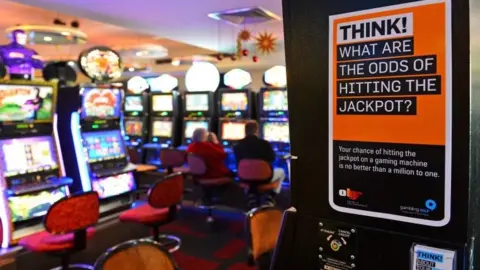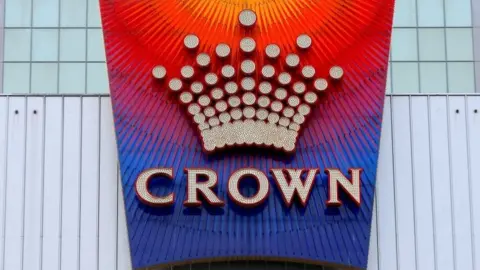Australia gambling: Landmark 'pokies' lawsuit dismissed
 AFP/Getty Images
AFP/Getty ImagesA former gambling addict has lost a landmark court case in Australia, after a judge rejected that she had been misled over her chances of winning.
Shonica Guy had argued that a casino and a manufacturer of slot machines - known in Australia as poker machines or "pokies" - had given players unrealistic expectations.
Her claim, specifically about a machine called Dolphin Treasure, was strongly rejected by both companies.
A judge ruled no law had been breached.
In finding for casino giant Crown and manufacturer Aristocrat, the Federal Court of Australia said Dolphin Treasure did not have "misleading or deceptive" design features.
Betting is a national obsession in Australia which has the world's highest gambling loss per head, according to recent research by UK consultancy H2 Gambling Capital.
Australian gambling losses hit a record high of A$24bn (£13bn; $19bn) in 2015-16, said government data released in October.
 Reuters
ReutersMs Guy had said she was hoping to prove that pokies were misleading and "designed to get us hooked".
"For too long now, we have been told we are the only ones to blame for pokies addiction," she said after filing her lawsuit in September.
Ms Guy said she lost 14 years of her life by playing pokies and wanted to help prevent others from having similar problems.
Dolphin Treasure offers cash prizes to players able to align matching symbols across a line of five revolving reels.
Ms Guy argued it was deceptive because the reels had varying amounts of symbols, as well as misleading sounds and imagery.
But Justice Mortimer disagreed, ruling it was not sufficiently confusing to breach consumer law.
She said the "randomness of the operation" became apparent as soon as someone began using the machine.
"It is not part of the court's task to characterise gambling as a desirable or undesirable activity," she said, the Australian Associated Press reported.
